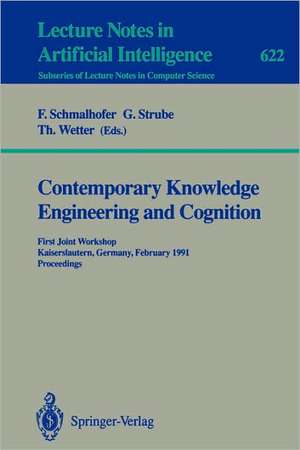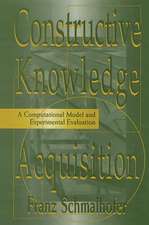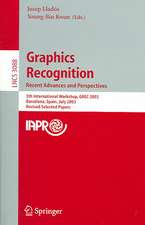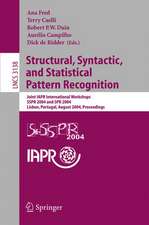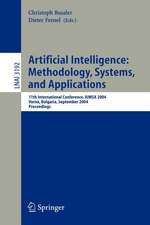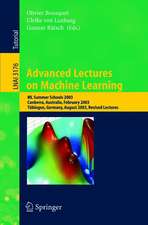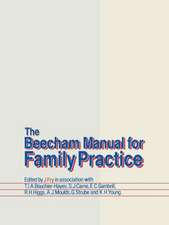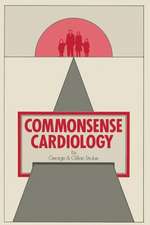Contemporary Knowledge Engineering and Cognition: First Joint Workshop, Kaiserslautern, Germany, February 21-22,1991. Proceedings: Lecture Notes in Computer Science, cartea 622
Editat de Franz Schmalhofer, Gerhard Strube, Thomas Wetteren Limba Engleză Paperback – 12 aug 1992
Din seria Lecture Notes in Computer Science
- 20%
 Preț: 1061.55 lei
Preț: 1061.55 lei - 20%
 Preț: 307.71 lei
Preț: 307.71 lei - 20%
 Preț: 438.69 lei
Preț: 438.69 lei - 20%
 Preț: 579.30 lei
Preț: 579.30 lei -
 Preț: 410.88 lei
Preț: 410.88 lei - 17%
 Preț: 427.22 lei
Preț: 427.22 lei - 20%
 Preț: 596.46 lei
Preț: 596.46 lei - 15%
 Preț: 448.04 lei
Preț: 448.04 lei - 20%
 Preț: 353.50 lei
Preț: 353.50 lei -
 Preț: 389.49 lei
Preț: 389.49 lei - 20%
 Preț: 309.90 lei
Preț: 309.90 lei - 20%
 Preț: 645.28 lei
Preț: 645.28 lei - 20%
 Preț: 763.23 lei
Preț: 763.23 lei - 15%
 Preț: 580.46 lei
Preț: 580.46 lei - 20%
 Preț: 310.28 lei
Preț: 310.28 lei - 20%
 Preț: 655.02 lei
Preț: 655.02 lei - 20%
 Preț: 1183.14 lei
Preț: 1183.14 lei - 20%
 Preț: 340.32 lei
Preț: 340.32 lei -
 Preț: 449.57 lei
Preț: 449.57 lei - 20%
 Preț: 591.51 lei
Preț: 591.51 lei - 18%
 Preț: 938.83 lei
Preț: 938.83 lei - 20%
 Preț: 337.00 lei
Preț: 337.00 lei - 20%
 Preț: 649.50 lei
Preț: 649.50 lei - 20%
 Preț: 607.40 lei
Preț: 607.40 lei - 20%
 Preț: 1414.79 lei
Preț: 1414.79 lei - 20%
 Preț: 1024.44 lei
Preț: 1024.44 lei - 20%
 Preț: 583.40 lei
Preț: 583.40 lei - 20%
 Preț: 453.32 lei
Preț: 453.32 lei - 20%
 Preț: 575.49 lei
Preț: 575.49 lei - 20%
 Preț: 1075.26 lei
Preț: 1075.26 lei - 20%
 Preț: 585.88 lei
Preț: 585.88 lei - 20%
 Preț: 825.93 lei
Preț: 825.93 lei - 17%
 Preț: 360.20 lei
Preț: 360.20 lei - 20%
 Preț: 763.23 lei
Preț: 763.23 lei - 20%
 Preț: 340.32 lei
Preț: 340.32 lei - 20%
 Preț: 504.58 lei
Preț: 504.58 lei - 20%
 Preț: 369.13 lei
Preț: 369.13 lei - 20%
 Preț: 580.93 lei
Preț: 580.93 lei - 20%
 Preț: 343.62 lei
Preț: 343.62 lei - 20%
 Preț: 350.21 lei
Preț: 350.21 lei - 20%
 Preț: 583.40 lei
Preț: 583.40 lei - 20%
 Preț: 583.40 lei
Preț: 583.40 lei - 15%
 Preț: 438.59 lei
Preț: 438.59 lei - 20%
 Preț: 341.95 lei
Preț: 341.95 lei - 20%
 Preț: 238.01 lei
Preț: 238.01 lei - 20%
 Preț: 538.30 lei
Preț: 538.30 lei
Preț: 331.40 lei
Preț vechi: 414.26 lei
-20% Nou
Puncte Express: 497
Preț estimativ în valută:
63.42€ • 65.97$ • 52.36£
63.42€ • 65.97$ • 52.36£
Carte tipărită la comandă
Livrare economică 14-28 aprilie
Preluare comenzi: 021 569.72.76
Specificații
ISBN-13: 9783540557111
ISBN-10: 3540557113
Pagini: 276
Ilustrații: XII, 260 p.
Dimensiuni: 155 x 235 x 14 mm
Greutate: 0.39 kg
Ediția:1992
Editura: Springer Berlin, Heidelberg
Colecția Springer
Seriile Lecture Notes in Computer Science, Lecture Notes in Artificial Intelligence
Locul publicării:Berlin, Heidelberg, Germany
ISBN-10: 3540557113
Pagini: 276
Ilustrații: XII, 260 p.
Dimensiuni: 155 x 235 x 14 mm
Greutate: 0.39 kg
Ediția:1992
Editura: Springer Berlin, Heidelberg
Colecția Springer
Seriile Lecture Notes in Computer Science, Lecture Notes in Artificial Intelligence
Locul publicării:Berlin, Heidelberg, Germany
Public țintă
ResearchCuprins
Relations between knowledge engineering and cognitive science: From import/export to a truly interdisciplinary knowledge acquisition enterprise.- Making application programming more worthwhile.- Using information technology to solve real world problems.- Facts, fantasies and frameworks: the design of a knowledge acquisition workbench.- Mapping expert behavior onto task-level frameworks: The need for “Eco-pragmatic” approaches to knowledge engineering.- Knowledge acquisition and the interpretative paradigm.- Case-based reasoning and model-based knowledge-acquisition.- The refitting of plans by a human expert.- Knowledge acquisition by generating skeletal plans from real world cases.- Knowledge acquisition from cases.- Transforming examples into cases.- Case-based reasoning and expert system development.- The role of cognitive science in knowledge engineering.- Knowledge acquisition as an empirically based modelling activity.- Shifting positions: Moving from a cognitive science point of view to a knowledge engineering stance.- Two questions from expert system developers to cognitive scientists.- The cognitive basis of knowledge engineering.- A comparative assessment of selected approaches in the focal area of knowledge engineering and cognition.
